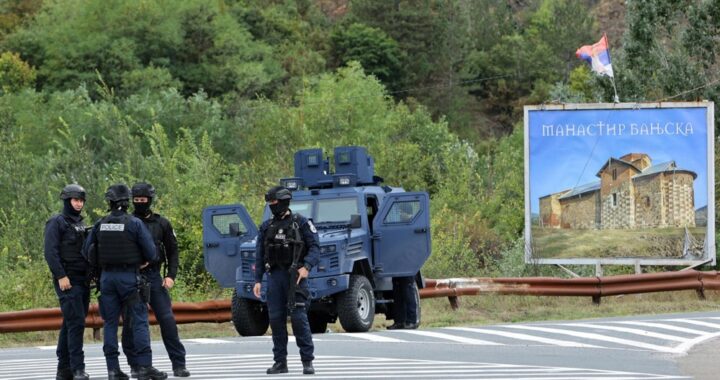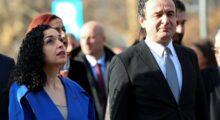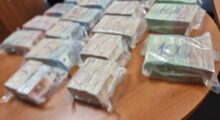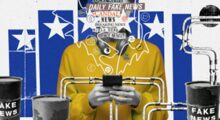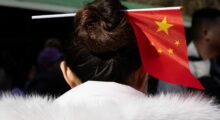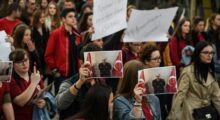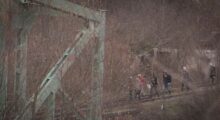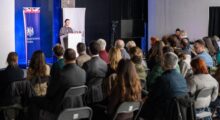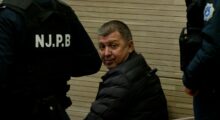Four of eight Kosovo Serbs arrested over the killing of a police officer at the weekend were released due to lack of evidence, prosecutors said on Wednesday, even as authorities produced more of what it said was proof of links between the gunmen and the government of neighbouring Serbia.
As Kosovo declared the dead police officer a national hero, Serbia and Serbs in Bosnia observed a day of mourning for three Serb gunmen killed in the clashes that followed.
Afrim Bunjaku was shot dead in the early hours of Sunday in what police said was an ambush in the northern village of Banjska/Banjske; the gunmen then took cover in the grounds of the local Orthodox monastery.
Police on Wednesday continued to comb the area around the monastery, banning journalists from following them due to the threat from “unexploded devices”.
“We found plenty” of such devices, said Veton Elshani, police deputy director in the north.
Serbia and Kosovo continued to trade blame for the dramatic escalation in a predominantly Serb-populated pocket of northern Kosovo, an area that has long resisted integration with the rest of the majority-Albanian country, a former southern province of Serbia that broke away in a 1998-99 war and declared independence in 2008.
Authorities named the three gunmen who died as Stefan Nedeljkovic, from the northern Kosovo municipality of Zvecan, and Igor Milenkovic and Bojan Mijailovic, both from Leposavic, also in the north.
Kosovo Interior Minister Xhelal Svecla identified Mijailovic as “the bodyguard” of Serbian intelligence chief Aleksandar Vulin when Vulin visited Kosovo in 2013 in his then post of cabinet minister in charge of Kosovo. Vulin’s party, Movement of Socialists, is a junior partner of Serbia’s ruling Progressive Party.
Based on an analysis of photographs, BIRN can confirm that Mijailovic was a Progressive Party activist.
Claim and counter-claim
On Monday, Svecla produced a video of what it said was Milan Radoicic, deputy leader of the Belgrade-backed Srpska Lista party in Kosovo, among the gunmen in Banjska/Banjske, calling it “yet more evidence of his terrorist activity”.
Serbian President Aleksandar Vucic has denied any Serbian state involvement, saying Kosovo Serbs had been forced to rise up against what he described as “ethnic cleansing” perpetrated by Kosovo’s government.
Serbian Foreign Minister Ivica Dacic called the video of Radoicic a “fraud”, saying it was not from the same day as the fighting.
Kosovo authorities originally said that around 30 gunmen were involved. Three were killed and a total of eight were arrested on Sunday and Monday.
It is unclear what happened with the rest of the group; the European Union’s office in Pristina told BIRN that the EU envoy had not received any request from Kosovo authorities for assistance in securing the extradition of any suspect from Serbia.
On Wednesday, special prosecutors said that “four persons who were arrested during the action of the Kosovo Police, in the village of Banjske in the municipality of Zvecan, far from the scene, were released yesterday… in the absence of evidence presented by the Kosovo Police”.
On Tuesday, three Kosovo Serbs were remanded in custody for 30 days by Pristina Basic Court.
Prosecution documents seen by BIRN accuse two of them and a number of unidentified co-conspirators of entering Kosovo “with dozens of vehicles filled with arms, ammunition and military uniforms”, blocking a road and ambushing police, killing Bunjaku and injuring another officer, Alban Rashiti.
The third is accused of providing surveillance support by videoing the movements of police units. His lawyer, Dejan Vasic, said he would appeal the custody ruling, saying his client was the victim of a “misunderstanding”.
Elshani said the police investigation was continuing. He defended the police response on Sunday.
“It was not our intention to kill 30 people, we did not intend to kill anyone,” he said. “Our only goal is to free our country from organised groups, and if during that process there are injuries or victims, it is part of the process.”







